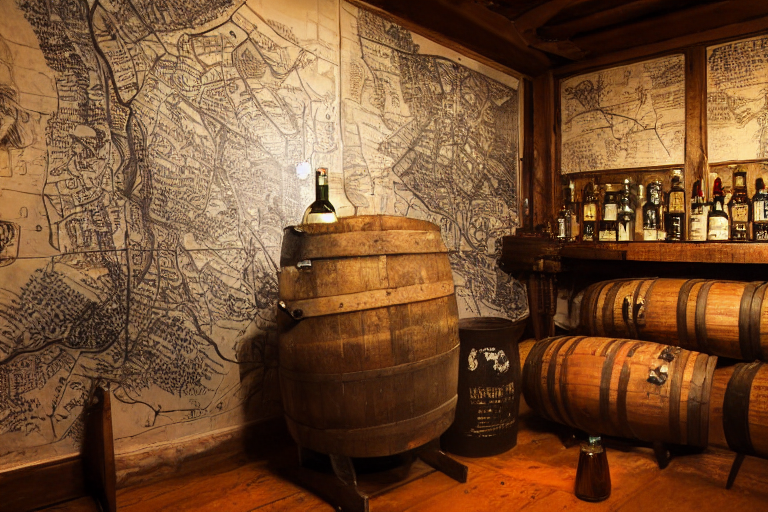Whisky: The Spirit of Distillation
Imagine a world where every sip tells a story—of grains, fermentation, and the magic of aging in oak casks. Whisky, that liquid gold, is more than just an alcoholic beverage; it’s a journey through time encapsulated in each glass.
The Origins and Varieties
Whisky, or whiskey, as its spelling varies by region, has been a part of human culture for centuries. The word itself traces back to the Classical Gaelic uisce beatha, meaning ‘water of life.’ This term captures not just the essence but also the reverence with which this spirit is treated.
The difference in spelling between whisky and whiskey is a matter of regional convention, with Ireland and the US preferring ‘whiskey,’ while other countries use ‘whisky.’ Regardless of the spelling, the core process remains the same: grains are fermented, distilled, and aged to perfection.
Aging and Classification
Whisky’s journey doesn’t end at distillation. It must age in wooden casks, typically charred white oak, for a minimum period that varies by type. This aging process is where the magic happens—whiskies develop their unique flavors, aromas, and colors.
The standards of whisky production vary worldwide, with different countries having their own traditions. For instance, Scotch must be distilled in Scotland and aged there for at least three years to be called Scotch. Similarly, American whiskeys have specific requirements that define them as bourbon or Tennessee whiskey.
Production Process
The production of whisky involves four main stages: grain preparation, fermentation, distillation, maturation, bottling, and marketing. Each step is crucial in crafting the final product.
Grain Preparation: Grains like barley, corn, rye, or wheat are soaked, germinated, dried, and milled to create malt. This malt is then introduced into a mashtun with hot water to extract sugars, which will later be fermented.
Fermentation: Saccharomyces cerevisiae yeast metabolizes the sugars in the mash, producing alcohol, carbon dioxide, and congeners. The temperature range for fermentation is carefully controlled to achieve the desired alcohol content.
Distillation: The liquid is transferred to a still where it’s heated to evaporate the alcohol while preventing water from boiling off. Only the middle portion of the distillate is collected, diluted, and then aged in casks.
The Role of Casks
Aging in wooden casks is crucial for whisky’s development. The type of oak used can impart different flavors, and up to 45 liters of whisky can evaporate from the cask over a four-year period, known as the angel’s share.
The ‘age’ of a whisky refers to the time between distillation and bottling. While older whiskies may have a rarity value, their age doesn’t necessarily determine quality. The aging process is where the true character of the spirit emerges.
Global Whisky Production
Whisky production has spread across the globe, with each region adding its unique twist to this ancient art. From Scotland’s rich history to Japan’s modern innovation, whisky continues to evolve and captivate drinkers worldwide.
The UK exports more than the rest of the world combined in 2022, with significant markets including the US, France, and other countries. The US is a major market for Scotch whisky, while Canada produces over 15 million cases annually.
Chemistry and Flavor
The chemistry behind whisky’s flavor profile is fascinating. Flavours are derived from carbonyl compounds, alcohols, carboxylic acids, tannins, and other polyphenolic compounds. The distinctive smoky flavour in some whiskies comes from peat smoke used to treat the malt.
Whiskies aged in oak barrels absorb substances like scopoletin, a compound with a strong coconut aroma, contributing to their unique taste. Even space-aged experiments have shown that aging whisky on Earth and in space can yield different results!
The Future of Whisky
As the world continues to explore new terroirs and techniques, the future of whisky looks bright. From the smallest distillery in Wales to the global recognition of Taiwanese whiskies, this spirit is here to stay.
Will you be part of the next chapter in whisky’s history? Will your taste buds be ready for the journey?

Whisky is more than just a drink; it’s a journey through time, culture, and the art of distillation. Whether you’re sipping on a classic Scotch or exploring new terroirs, every glass tells a story. So, raise your glass and let’s toast to the spirit that has captivated us for centuries.
You want to know more about Whisky?
This page is based on the article Whisky published in Wikipedia (retrieved on March 13, 2025) and was automatically summarized using artificial intelligence.





